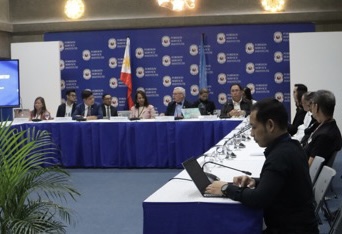PH calls on UN special rapporteur to engage with NTF-ELCAC
By Raymund Antonio and Raymund Antonio
The Philippine government asked United Nations (UN) Special Rapporteur Dr. Ian Fry to engage in a “genuine dialogue” with the National Task Force to End Local Communist Armed Conflict (NTF-ELCAC) after he suggested that the task force be abolished.
 UN Special Rapporteur Ian Fry with Philippine government representatives during an exit conference at the Department of Foreign Affairs. (Photo by Camille Barizo/DFA)
UN Special Rapporteur Ian Fry with Philippine government representatives during an exit conference at the Department of Foreign Affairs. (Photo by Camille Barizo/DFA)
In a statement on Wednesday, Nov. 15, the Department of Foreign Affairs (DFA) invited Fry, the first UN Special Rapporteur on the promotion and protection of human rights in the context of climate change, to understand the Philippine context better.
“With respect to Dr. Fry’s comments on political and security matters, the Government urged the Special Rapporteur to have a more comprehensive appreciation of the Philippine context and engage in genuine dialogue with the National Task Force to End Local Communist Armed Conflict,” DFA said.
At a press conference after his 10-day mission in the Philippines that started on Nov. 6, the UN official urged the Philippines to disband the controversial NTF-ELCAC.
“I met with civil organizations who told me horrific stories on how they were treated, and in my recommendation to the government, I have suggested that they disband the ELCAC because it is clear that ELCAC is operating beyond its original mandate and its red-tagging on the people in the community and the indigenous people and that private financial interest are driving ELCAC to do this,” he said.
Fry suggested that another body should be created to replace the task force, which had been operating with impunity.
“I heard of cases of torture, disappearance and extrajudicial killings of people. This is totally unacceptable and it seems the government has lost control of some of its military organizations and is moving beyond what is considerably reasonable,” he added.
The NTF-ELCAC was organized under the previous Duterte administration as part of the government’s efforts to enhance its counter-insurgency programs.
But instead of going solely after communist groups, it had red-tagged civil society groups, journalists, celebrities, among others.
Undersecretary Severo Catura of the Presidential Human Rights Committee Secretariat expressed the Philippine government’s willingness to further engage with Fry “to clarify ongoing complex challenges which he may not have fully appreciated during his short visit.”
Catura, Climate Change Commission Vice-Chair Secretary Robert Borje, and DFA Assistant Secretary Maria Teresa Almojuela “all highlighted the vibrancy of Philippine democracy, the openness to engage in dialogue, and the commitment to work together with the UN and other stakeholders to advance global and national commitments to climate change and human rights instruments.
Meanwhile, Fry also acknowledged that the Philippines has “very good policies and legislation” on climate change, though he stressed the need to do more.
He underscored the critical role of the international community, particularly developed countries, to provide enhanced climate financing and support to the Philippines and other vulnerable countries to effectively combat climate change.
Representatives from the Climate Change Commission, Presidential Human Rights Committee Secretariat, Department of Environment and Natural Resources (DENR), and the DFA met with Fry at the conclusion of his 10-day visit to the country.
He conducted site visits across the country, including in Manila, Valenzuela City, Leyte, and Iloilo City.
The Philippines invited the UN official as part of its open and constructive engagement on human rights with relevant UN mechanisms.